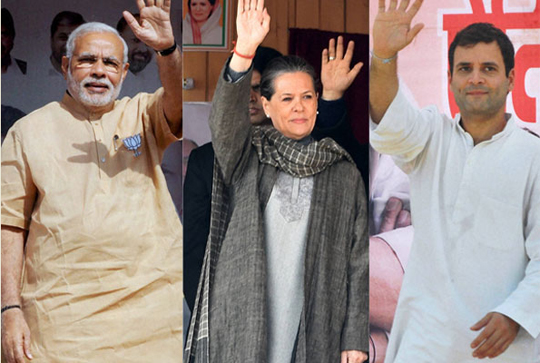Kasaragod, May 3: With just two weeks to go for the election, the leaders of the national parties are turning their attention to Kerala with the promise of taking the political debate to newer directions.

The campaign for the assembly election in Kerala was so far dominated by the war of words between Opposition Leader V S Achuthanandan and Chief Minister Oommen Chandy.
Congress leader and former defence minister A K Antony has already started his campaign in Kerala by stating that the aim of United Democratic Front (UDF) is to ensure a BJP-free assembly. He said that there is a close fight going on between the Left Democratic Front (LDF) and UDF.
Congress president Sonia Gandhi will reach Kerala on May 9 while Rahul Gandhi will be in the state on May 11 to 12. Other leaders like Ghulam Nabi Azad, Mallikarjun Kharge and Sachin Pilot are expected to visit Kerala to campaign for UDF.
An array of national leaders of BJP led by the Prime Minister Narendra Modi are expected to reach Kerala to lead the campaign of the state unit.
BJP president Amit Shah's programme in Kerala is from May 1 to 14. Prime Minister Narendra Modi will reach Kerala on May 6. He will address 5 rallies from May 6 to 11. For the first time the PM will address a massive crowd in Kasaragod on May 8 at 9:30 a.m.
Nine other ministers including Union home Minister Rajnath Singh are expected to land in the state for campaigning for BJP. CPI(M) leaders like Prakash Karat and Sitaram Yechury have started campaigning for LDF in Kerala. Their main task would be to defend the party's strategy in West Bengal to team up with Congress.
BJP state president Kummanam Rajashekharan said that A K Antony's statement that BJP will not open its account in Kerala is his "day dream". He added that state saw the worst communal riot when A K Antony was the Chief Minister.
V S Achuthanandan said that Antony should tell this to his disciple Oommen Chandy, indirectly suggesting that Oommen Chandy has made a deal with BJP. The VS-Chandy war of words started with the speech that VS Achuthanandan made at Darmadam in which he said that there were 31 cases pending against Chandy and 136 cases against he and his cabinet colleagues.
Oommen Chandy retorted by stating that it is a lie and filed a defamation suit against V S Achuthanandan. He also made a complaint against him to the EC. He said if Achuthanandan is making such statements the people will see to it that he is keeping quiet.
Achuthanandan replied that Chandy is asking people to revolt and said that he will furnish all the details of the cases to the Court.





 Welcoming the move Dr Arathi Krishna told coastaldigst.com that Indians stranded in any foreign country can utilize this facility. "Initially, I was approached by Mr Zakaria and Mr Sheik who wanted chartered flights to help their employees fly back to India. I asked them to write to the Indian Ambassador in Saudi Araia Mr Ausaf Sayeed. Then I requested the ambassador to forward the request to Joint Secretary Dr Nagendra Prasad, who is in charge of gulf division in the Ministry of External Affairs, and then to Secretary on charge of Gulf and then I requested Secretary of Economic Relations Mr T S Tirumurti who was also in charge of Gulf to follow this up," she said.
Welcoming the move Dr Arathi Krishna told coastaldigst.com that Indians stranded in any foreign country can utilize this facility. "Initially, I was approached by Mr Zakaria and Mr Sheik who wanted chartered flights to help their employees fly back to India. I asked them to write to the Indian Ambassador in Saudi Araia Mr Ausaf Sayeed. Then I requested the ambassador to forward the request to Joint Secretary Dr Nagendra Prasad, who is in charge of gulf division in the Ministry of External Affairs, and then to Secretary on charge of Gulf and then I requested Secretary of Economic Relations Mr T S Tirumurti who was also in charge of Gulf to follow this up," she said.
Comments
All thieves coming to Kasargod now.
Till now where was these thieves.
This time congress, we have seen Modi's ache din people have learnt more from it.
BJP will win the seat in majority.
Add new comment